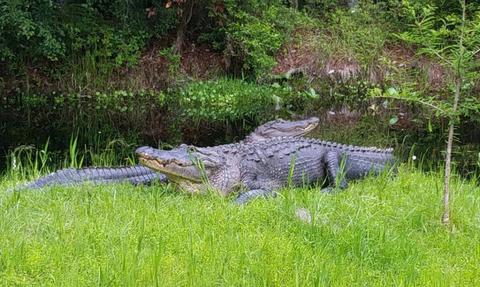当前位置:
X-MOL 学术
›
Funct. Ecol.
›
论文详情
Our official English website, www.x-mol.net, welcomes your
feedback! (Note: you will need to create a separate account there.)
Associations between testosterone and immune activity in alligators depend on bacteria species and temperature
Functional Ecology ( IF 4.6 ) Pub Date : 2021-01-18 , DOI: 10.1111/1365-2435.13756 Ashley A. LaVere 1 , Heather J. Hamlin 2 , Russell H. Lowers 3 , Benjamin B. Parrott 1, 4 , Vanessa O. Ezenwa 1, 5
中文翻译:

扬子鳄的睾丸激素和免疫活性之间的关联取决于细菌的种类和温度
更新日期:2021-01-18
Functional Ecology ( IF 4.6 ) Pub Date : 2021-01-18 , DOI: 10.1111/1365-2435.13756 Ashley A. LaVere 1 , Heather J. Hamlin 2 , Russell H. Lowers 3 , Benjamin B. Parrott 1, 4 , Vanessa O. Ezenwa 1, 5
Affiliation

|
- The immunocompetence handicap hypothesis (ICHH) postulates that testosterone supports the development of secondary sexual traits while simultaneously suppressing immune function, creating a trade‐off between trait quality and pathogen vulnerability.
- The nature of interactions between testosterone and immunity is complex. Conflicting patterns from the literature suggest that testosterone–immunity relationships are variable across immune measures and may be modified by factors both intrinsic and extrinsic to the organism.
- In this study, we tested the ICHH in free‐ranging American alligators Alligator mississippiensis and examined how both intrinsic (steroid hormone levels) and extrinsic (temperature) factors modulate the relationship between testosterone and immunity. Specifically, we quantified the simultaneous effects of testosterone and dehydroepiandrosterone (DHEA) on microbial killing capacity of three bacteria species (Escherichia coli, Salmonella typhimurium and Klebsiella pneumoniae) at two challenge temperatures (15°C and 30°C).
- We found that accounting for circulating levels of DHEA was important for predicting testosterone‐mediated effects on microbial killing capacity. We also found that testosterone‐mediated immunosuppression was dependent on temperature and bacteria species, with negative effects of testosterone present only for S. typhimurium at 15°C.
- Our results highlight the context dependency of interactions between testosterone and immunity, and illustrate the importance of evaluating the ICHH in natural systems to identify key intrinsic and extrinsic factors modulating testosterone‐immunity trade‐offs.
中文翻译:

扬子鳄的睾丸激素和免疫活性之间的关联取决于细菌的种类和温度
- 免疫能力障碍假说(ICHH)假设睾丸激素支持继发性性状的发展,同时抑制免疫功能,从而在性状质量和病原体易感性之间进行权衡。
- 睾丸激素和免疫之间相互作用的性质很复杂。来自文献的相互矛盾的模式表明,睾丸激素与免疫之间的关系在各种免疫措施之间是可变的,并且可能会被有机体的内在和外在因素所改变。
- 在这项研究中,我们在自由放养的美国短吻鳄短吻鳄中检测了ICHH,并研究了内在的(类固醇激素水平)和外在的(温度)因子如何调节睾丸激素和免疫力之间的关系。具体来说,我们量化了在两个挑战温度(15°C和30°C)下,睾丸激素和脱氢表雄酮(DHEA)对三种细菌(大肠杆菌,鼠伤寒沙门氏菌和肺炎克雷伯菌)的微生物杀灭能力的同时影响。
- 我们发现,考虑到DHEA的循环水平对于预测睾丸激素介导的对微生物杀灭能力的影响非常重要。我们还发现,睾丸激素介导的免疫抑制作用取决于温度和细菌种类,在15°C下仅对鼠伤寒沙门氏菌存在睾丸激素的负面影响。
- 我们的结果突出了睾丸激素和免疫之间相互作用的背景依赖性,并说明了在自然系统中评估ICHH的重要性,以识别调节睾丸激素-免疫权衡的关键内在和外在因素。











































 京公网安备 11010802027423号
京公网安备 11010802027423号